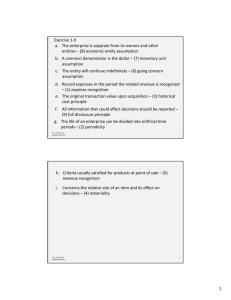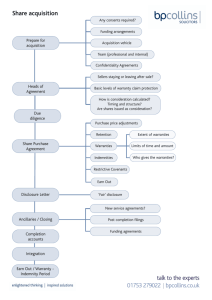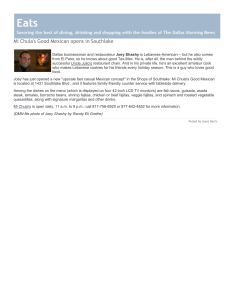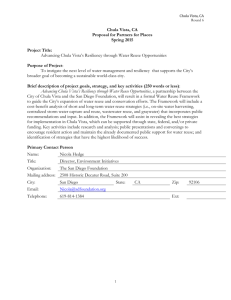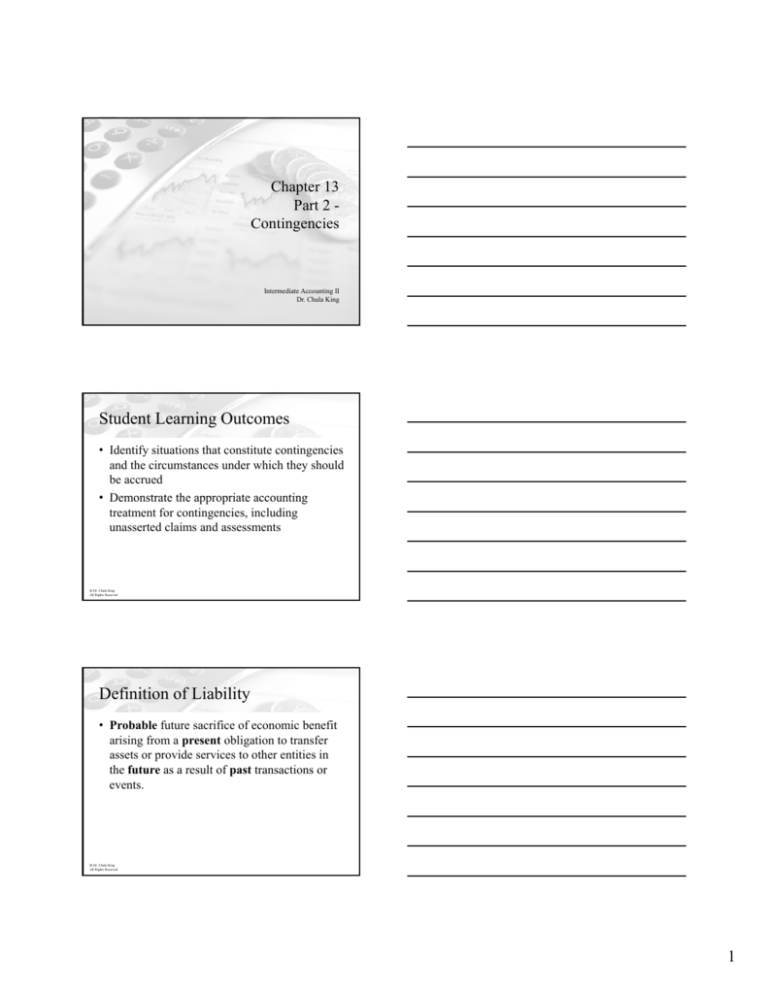
Chapter 13
Part 2 Contingencies
C ti
i
Intermediate Accounting II
Dr. Chula King
© Dr. Chula King
All Rights Reserved
Student Learning Outcomes
• Identify situations that constitute contingencies
and the circumstances under which they should
be accrued
• Demonstrate the appropriate accounting
treatment for contingencies, including
unasserted claims and assessments
© Dr. Chula King
All Rights Reserved
Definition of Liability
• Probable future sacrifice of economic benefit
arising from a present obligation to transfer
assets or provide services to other entities in
the future as a result of past transactions or
events.
© Dr. Chula King
All Rights Reserved
1
Loss Contingency
• Existing uncertain situation involving potential
loss depending on whether some future event
occurs
• Factors affecting whether loss contingency is
accrued and reported as a liability
The likelihood that the confirming event will occur
Whether the loss amounts can be reasonably
estimated
© Dr. Chula King
All Rights Reserved
Likelihood of Occurrence
• Probable – a confirming event is likely to
occur
• Reasonably Possible – the chance the
confirming event will occur is more than
remote, but less than likely
• Remote – the chance the confirming event will
occur is slight
© Dr. Chula King
All Rights Reserved
Loss Contingencies
Dollar Amount of Potential Loss
Likelihood
Probable
ob b e
Reasonably possible
Remote
Known
Subject to
Reasonable
Estimation
Not subject to
Reasonable
Estimation
Liability accrued
and
d ddisclosure
sc osu e note
oe
Liability accrued
and
d ddisclosure
sc osu e note
oe
Disclosure note
oonly
y
Disclosure note
only
Disclosure note
only
Disclosure note
only
No disclosure
required
No disclosure
required
No disclosure
required
A loss contingency is accrued only if a loss is probable
and the amount can be reasonably estimated
© Dr. Chula King
All Rights Reserved
2
Product Warranties and Guarantees
• Product warranties inevitably entail costs, i.e.,
they are probable
• The amount of those costs can be reasonable
g commonly
y available
estimated using
estimation techniques
• Therefore, a liability for the estimated cost
should be accrued
Warranty expense
Estimated liability for warranty
© Dr. Chula King
All Rights Reserved
For Example
• Apex, Inc., sold a product that carried a oneyear warranty against defects. Estimates based
upon past experience and industry standards
indicate that warranty costs approximate 3% of
sales. During 2013, sales of the warranty
based product were $2,000,000, and were all
on account. In 2013, Apex paid $10,000 to
service the warranties.
© Dr. Chula King
All Rights Reserved
For Example (continued)
Accounts receivable
2,000,000
Sales revenue
2,000,000
Warranty expense (3% x 2,000,000)
60,000
Estimated liability for warranty
60,000
60 000
(entry to estimate total warranty costs)
Estimated liability for warranty
10,000
Cash, parts, etc.
10,000
(entry to record actual expenditures for warranty)
© Dr. Chula King
All Rights Reserved
3
Extended Warranty Contracts
• Sold separately from the product
• The related revenue is not earned until
Claims are made against the extended warranty;
OR
The extended warranty period expires
• Entry to record the sale of extended warranty
Cash
Unearned warranty revenue
© Dr. Chula King
All Rights Reserved
Premiums
• Included with the product
• Expensed in the period of the sale of the
product
• Contingent
C i
on action
i by
b the
h customer, andd
require accounting similar to warranties
© Dr. Chula King
All Rights Reserved
Subsequent Events
• Events occurring between the fiscal year-end
date and the date financial statements are
issued can affect the appearance of disclosures
on financial statements
• Events occurring after the year-end date but
before the financial statements are issued can
also affect the appearance of disclosures on the
financial statements
© Dr. Chula King
All Rights Reserved
4
Unasserted Claims and Assessments
Unasserted claim
No
disclosure
needed
No
Is a claim
or assessment
probable?
Yes
© Dr. Chula King
All Rights Reserved
Evaluate (a) the likelihood of an unfavorable outcome and
(b) whether the dollar amount can be estimated.
An estimated loss and contingent liability would be
accrued if an unfavorable outcome is probable and the
amount can be reasonably estimated.
The Next Step
• Exercises 2, 3, 5, 6, 7, 15, 19, 24
• Problems 2, 4, 5, 6
© Dr. Chula King
All Rights Reserved
5

